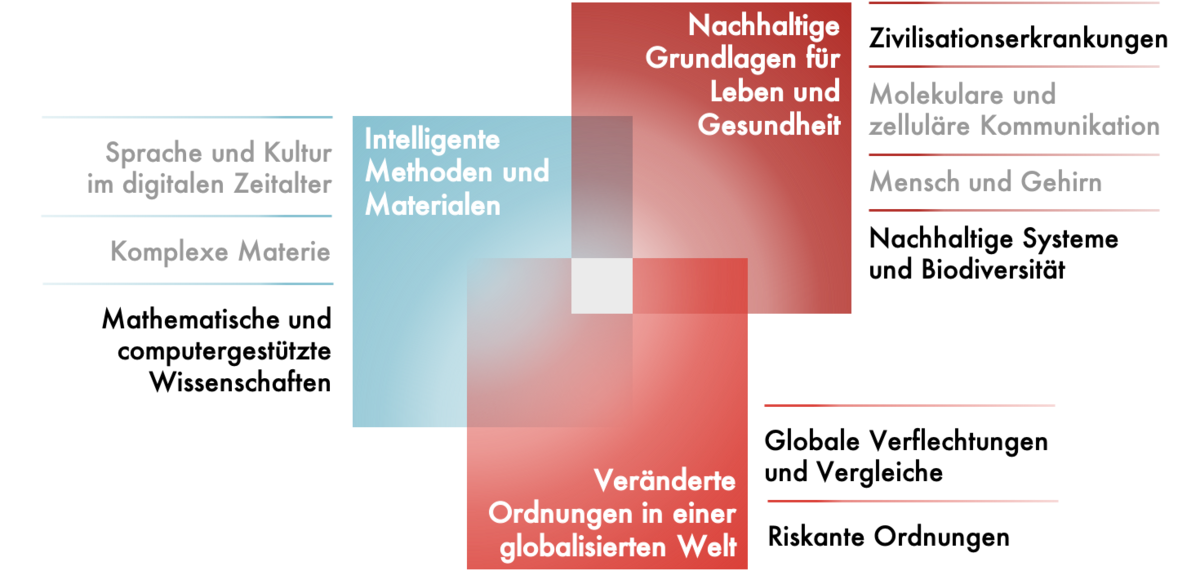In this section of our homepage we would like to provide you with some insights into the research activities at our faculty. We would like to point out that this can only represent a selection of those being performed. More comprehensive and detailed information is available on the pages of the institutes and chairs and on request from the respective professors and staff.
Profile of the Faculty in the research landscape of Leipzig University
In the competition among Germany's universities with strong research and medical offers, Leipzig University (LU) is striving for top positions in the future in line with its goals laid down in the University Development Plan 2025. Increasingly supported by inter- and transdisciplinary collaborative structures and a dynamically developing research profile, the university takes a focused scientific look at complex, forward-looking and socially relevant issues of our age.
The Faculty of Economics and Management Science views its contribution towards the further development of the university in the application of economic methods in explaining social phenomena and in developing design recommendations. Their object of knowledge and their fields of work are characterised in an abstract sense by the field of tension between the scarcity of resources on the one hand and the basically unlimited needs on the other.
In its profiling process, the Faculty relies on increased cooperation within the university that transcends faculty boundaries, as well as active collaboration in the research profile areas that were identified by the LU in a competitive process - the Faculty currently contributes its expertise to five of the nine research profile areas.
The Faculty also sees a special opportunity for international profiling in deepening cooperation with other universities, the Leipzig University of Applied Sciences (HTWK) and non-university research institutions in the Leipzig research area. Examples include the DFG-funded German Centre for Integrative Biodiversity Research Halle-Jena-Leipzig (iDiv), the Helmholtz Centre for Environmental Research (UFZ), the German Biomass Research Centre (DBFZ), the Fraunhofer Centre for International Management and Knowledge Economy (IMW), the Leibniz Institute for Regional Geography (IfL) and the Leibniz Institute for Economic Research Halle (IWH). These collaborations include joint appointments, teaching in the Master's field by lecturers from the extra-university research institutions and joint courses within the framework of structured doctoral programmes for interested doctoral students from extra-university research institutions as well.
Joint appointments
The Faculty's joint appointments set the framework for investigations in specialised areas of economics. Here we cooperate with the Helmholtz Centre for Environmental Research (UFZ), the Fraunhofer Centre for International Management and Knowledge Economy in Leipzig (IMW), the Leibniz Institute for Economic Research Halle (IWH) and the German Centre for Integrative Biodiversity (iDiv).
We would like to briefly introduce these special chairs to you here.
Chair of Economics/Institutional Environmental Economics (jointly with the Helmholtz Centre for Environmental Research - UFZ)
Since October 2008, the chair of economics, in particular institutional economic environmental research, has existed as a joint appointment of Leipzig University and the Helmholtz Centre for Environmental Research (UFZ). The chair is part of the Institute for Infrastructure and Resource Management of the Faculty of Economics and Management Science.
The research approach of the chair is upon the analysis of environment-related issues with the help of approaches from New Institutional Economics, such as transaction cost economics, the theory of institutional change, contract and agency theory, the property rights approach, the economic analysis of law, politics and bureaucracy or information economics.
A large proportion of the research takes place at the Helmholtz Centre for Environmental Research. In their research activities, the staff of the UFZ and the Chair of Economics/Institutional Environmental Economics deal with the following topics, for example:
- Economics of climate change, especially climate adaptation (UFZ)
- Economic aspects of bioenergy use (UFZ)
- Pricing solutions for water services (UFZ)
- Environmental interface problems in the fields of energy, transport, technical infrastructure (IIRM)
- Financing of transport infrastructure (IIRM)
- Fee and charge solutions for municipal supply and disposal (water, wastewater, waste) (IIRM)
At the Faculty of Economics and Management Science of the Leipzig University, the staff of the chair organise courses in the fields of environmental, resource and energy economics, new institutional economics and economic analysis of environmental law.
Endowed Chair of Bioenergy Systems (jointly with the Helmholtz Centre for Environmental Research - UFZ)
Bioenergy systems research
The chair of Bioenergy Systems have been in existence since October 2011, which is part of the Institute for Infrastructure and Resource Management (IIRM) of the Faculty of Economics and Management Science and with which there are close links with the German Biomass Research Centre and the Helmholtz Centre for Environmental Research (UFZ). Thus, the technical, ecological and economic aspects of biomass use are linked in research and teaching in a manner adequate to address the problem and offer a rare starting point for essential questions of a future bioeconomy. The research focus is on linking the fragmentary information available along the process chains towards the development of integrated management systems for the provision of bioenergy. Methods of potential analysis, material and energy flow analysis, scenario development and material flow assessment are applied.
In the lecturing field, the chair complements the range of courses offered by the Faculty of Economics and Management Science at the Leipzig University with lectures on the fundamentals of resource availability, on energy fundamentals, on environmental assessment and on scenarios for sustainable biomass use.
The Chair of Bioenergy Systems is also one of the IIRM chairs represented in the BioEconomy initiative. The Federal Ministry of Education and Research (BMBF) awarded the initiative as part of the Leading-Edge Cluster Competition. Research institutions of the Fraunhofer Society, the University of Halle-Wittenberg, the UFZ Leipzig, the Leipzig Graduate School of Management, the German Biomass Research Centre (DBFZ Leipzig) as well as the IIRM of the Leipzig University scientifically support the initiative. Numerous large industrial groups and around 40 innovative, medium-sized companies are part of the new Central German Leading-Edge Cluster on behalf of the business economy. The stakeholders want to establish a new bio-based industry with additional jobs in the region and further optimise value creation from biomass.
Furthermore, the chair stands out due to its close cooperation with regional, national and international research stakeholders. Among other things, it is a member of the European Biomass Platform and the ISO Committee for Biogenic Solid Fuels.
Profiling within the Faculty of Economics and Management Science’s fields of expertise
Through the targeted internal development of the Faculty's own research and third-party funded subject areas, it has been possible in recent years to identify important areas of expertise for the Faculty of Economics and Management Science, while repeatedly taking into account the parallel process of creating research profile lines at the University. These already have internationally recognised expertise and, at the same time, a high level of connectivity to the aforementioned research profiles of the university.
This relates to the following fields of expertise:
- Sustainability management, infrastructure economics and public economy
- Sustainable financial markets, financial institutions and financial services
- Structural change and economic crises in a globalised world
- Corporate accounting, financing and taxation
- Service and Relationship Management
- Individualised information and application systems
The aforementioned fields of expertise describe the central main areas of research of the Faculty of Economics and Management Science. They merge the business administration, economics, business education and information systems expertise of the Faculty on a topic-specific basis and thus ensure a high level of cooperation with other faculties (e.g. in the context of the research profile lines) or with internationally leading non-university research institutions.
While some institutes are at the core of the aforementioned fields of expertise, other institutes actively collaborate in several fields of expertise, ensuring a high level of intra-faculty collaboration with high synergy potential.





